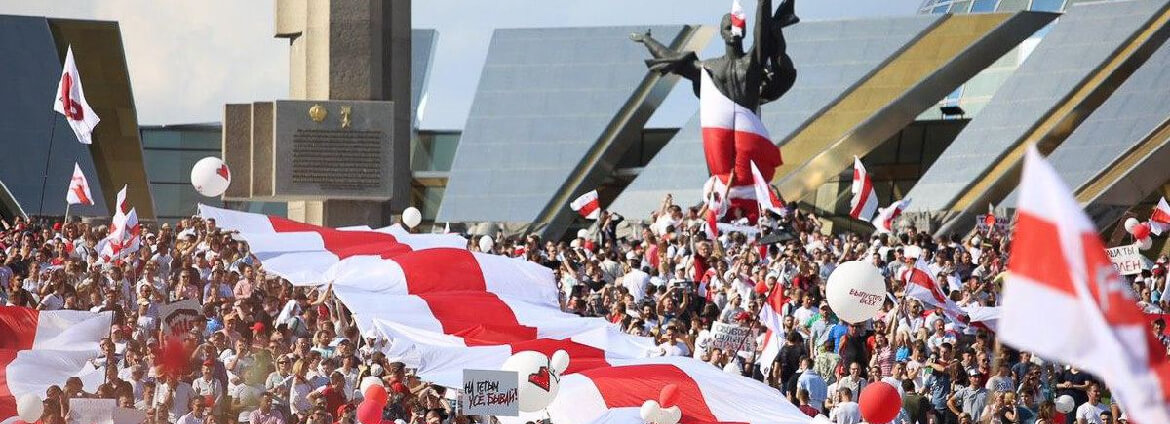Pro-Russian activists urged to ban Belarus national flag
Post-election protests in Belarus continue for 177 consecutive days.
Protest activity continues on a daily basis in a form of ‘partisan marches’ in numerous residential areas, flash mobs, and other forms of civil disobedience in Minsk and large regional towns (Zhodzina, Zaslauye). Despite claims that the situation is under complete control, militsiya still can not contain ‘unauthorized’ protest activity in residential areas since most protest marches pop up without public notice.
Only within Sunday, at least 169 people were detained on political grounds, most of them in Minsk. As a rule, the detentions are brutal, indiscriminatory, and are often targeted against uninvolved passersby, including the elderly and minors. Journalists, including accredited foreign correspondents, are still being kidnapped without explanations. Since detentions, judicial proceedings, and subsequent arrests are conducted in violation of all procedures and requirements set up by national legislation and international obligations of the Republic of Belarus, they shall be treated as enforced disappearances as considered by victims, rather than legally enforced ‘detentions’ by legitimate law enforcement bodies.
The list of political prisoners grew substantially in January, and there are now at least 220 people acknowledged in this status by authoritative human rights group Viasna. The regime of Aliaksandr Lukashenka purported to trade political prisoners in exchange to ending of protests via Lukashenka’s proxy Yuri Vaskresenski who threatened the protesters to end the campaign of ‘meaningless’ peaceful disobedience. However, this idea was abandoned after it proved ineffective to disperse grassroot-organized protests. Now, Lukashenka claims there are no political prisoners in Belarus. Despite Vaskresenski’s efforts to imitate «democratic dialogue» under guidance from Belarus state security agencies and presidential administration, his venture gained very little support or public trust.
In Minsk, militsiya and masked plain-clothed workers of state security and interior ministry continue terrorizing the inhabitants of ‘disobedient’ residential areas. These 42 locations of ‘reinforced patrolling’ in Belarusian capital are locally referred to as ‘ghettos’ as compared to Jewish ghettos set up by nazis in the 1940s. The inhabitants of ‘ghettos’ protest their ‘reinforced patrolling’ status by paint-spraying yellow David’s starts with numbers corresponding to their ‘ghetto’ areas as set by the acting civil administration in Minsk.
One of the most targeted areas is Novaya Borovaya – a residential are with slightly 10,000 population in the village of Kopishcha bordering Minsk. This popular spot of middle class accommodation, became known for its political activism in 2020, and has turned into a territory of day-to-day civil resistance and civic leadership. Militsiya and unknown masked people arrange regular raids on Novaya Baravaya, threaten and intimidate local civil population (mostly, mid-aged middle class Belarusians). The militsiya is particularly interested in chasing people with national flags and symbols in their apartments, windows and balconies. There are reports of civilians being lured out of their homes by targeted power outages caused by militsiya employees.
There’s been at least one case of elevator harassment of a minor by plain-clothed workers of state security. The case was caught on tape. Militsiya and plane-clothed security workers enter the premises of privately owned co-ops in Novaya Baravaya with their own keys (very likely, all keys are provided by a private maintenance company, A-100 Comfort, affiliated with real estate tycoon Alexander Tsenter who services housing Novaya Baravaya). Militsiya and plane-clothed security workers illegally search mailboxes of private individuals without their consent or presence and request every person who enters and leaves buildings to provide their personal data with no legal grounds to do so. Uniformed individuals and unknown masked state security workers in civil clothes trespass fenced yards of co-ops in Novaya Baravaya and intentionally crash, burn, and steal property of the inhabitants of Novaya Baravaya in acts of politically-motivated state-led violence.
A few residents were pointed at with a gun in their fenced yards during intimidation raids by plain-clothed militsiya workers. Local residents are being kidnapped and brought into state-run detention centers on a regular basis with no legal grounds.
Last week, Miguel Berger, State Secretary of the German Foreign Ministry, announced that Germany will initiate the creation of an international mechanism for the criminal prosecution of those involved in human rights violations in Belarus. Germany would also adopt a law that will prohibit German companies from working with foreign enterprises involved in violations of human rights are violated. Focus on international prosecution of all officials involved in repressions is of absolute importance now since Belarusian system of law enforcement and judiciary ceased to perform their functions and turned into weapons of political terror.
Terror is being legalized as a tool in a bigger game of Lukashenka and his vis-a-vis in the Kremlin who push Lukashenka into further integration with Russia. On February 11-12 a so-called Belarusian People’s Congress will take place in Minsk which will be used to promote Lukashenka’s absolute control of political situation internally. This event will gather 2700 followers of the so-called ‘president’ in an effort to imitate ‘direct democratic governance’. The so-called Belarusian People’s Congress is a non-binding body of Lukashenka’s followers which is not mentioned by the Constitution, and was initiated by Lukashenka himself in 1996 outside any legal framework to promote his ‘course’. No decisions of this body have or may have any legal consequences, according to Belarusian laws. Having used Russia’s support in August 2020, Lukashenka is now trying to counterbalance Russia’s push towards ‘deep integration’ by faking public support of his own leadership.
Another move that requires additional attention from the international community is the regime’s move to declare national white-red-white flag of Belarus ‘extremist’ upon a request of pro-Russian activists lead by Piotr Shapko, a co-founder of ultra-religious paramilitary group «Kazachi Spas». Since recently, Shapko aims to create a pro-Russian ultraconservative party «Rodzina» (Homeland), and is often used by Belarus state propaganda and Radio Sputnik as an ‘opinion leader’. Although Shapko’s comrades gathered slightly a hundred signatures under their request to legally acknowledge Belarus national flag ‘extremist’, the petition in support of a flag gathered close to 80.000 signatures over first three days.
The situation in Belarus is becoming even more disturbing considering the publication of facts exposed by BYPOL* in January.
In mid-January, BYPOL published a leaked record exposing Lukashenka’s order to set up a concentration camp for political prisoners. Later, images of the camp showing barbed wire fences, guards armed with assault rifles, and wooden watchtowers were published by Radio Liberty. The images of a camp that was built on August 10-12 were provided by one of the contractors who was engaged in building process. The camp was run as a joint effort of Belarus army and the ministry of interior, and was created to accommodate up to 2000 detainees. The detainees were all suddenly released on August 15.
Later on, BYPOL published the results of their own investigation into kidnapping and murder of Raman Bandarenka and published a detailed report on the events that took place the Square of Changes last November. The investigation leads to high-rank individuals in Lukashenka’s administration, state TV, the ministry of interior, as well as personal trainer of Lukashenka’s youngest son, Mikalai. Soon after the publication, the BCSF/Belarusian Culture Solidarity Foundation, with the support of the Coordinating Council and the People’s Anti-Crisis Management (NAU), has launched a campaign to remove Belteleradiocompany (BTRC) from the list of the European Broadcast Union (EBU) members. So far, EBU remains reluctant from making this decision despite BTRC’s direct involvement in spread of hate speech, endorsement of violence and political repressions, and promotion of propaganda.
On January 30, BYPOL exposed information that Belarusian army plans sending 600 soldiers to conduct military patrols in Syria. Belarus ministry of defense neither confirmed, nor denied this information. In our opinion, there are two possible reasons for Lukashenka to urgently send troops into Syria and engage into war that has no relation to Belarus which must remain a neutral country according to the Constitution. firstly, it may be considered an effort to show loyalty to Vladimir Putin. Secondly – an effort to again play «Helsinki-2» card with the West by highlighting Lukashenka’s image of regional peacemaker and stabilizer after all his initiatives for Donbass were dismissed without serious debate.
*BYPOL is an independent initiative that emerged soon after August 2020 events in Belarus. It unites independent representatives of Belarus law enforcement agencies, including former investigators, prosecutors, judges, and other law enforcement professionals who refused to accept the results of rigged elections and stood up against state-orchestrated violence.










